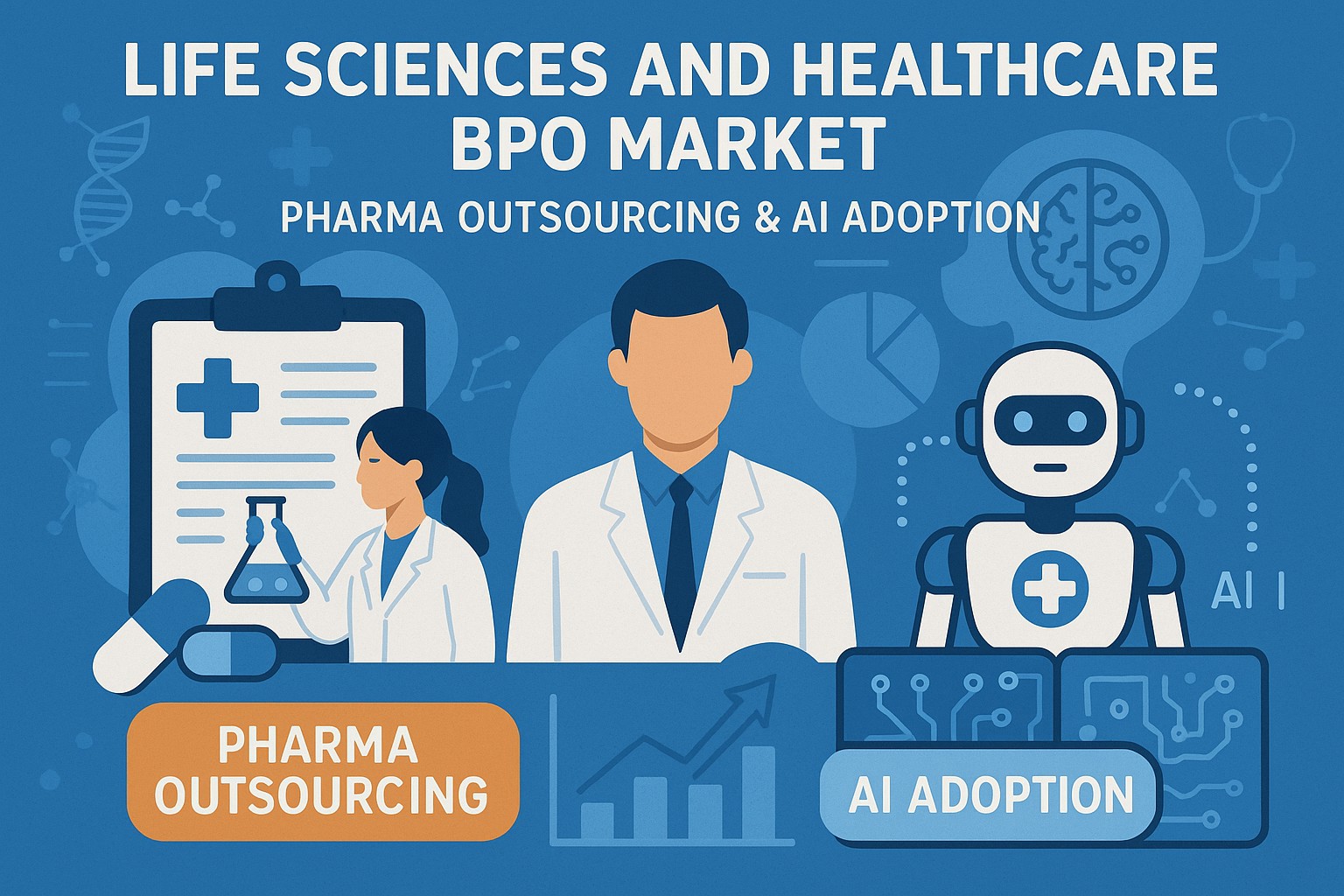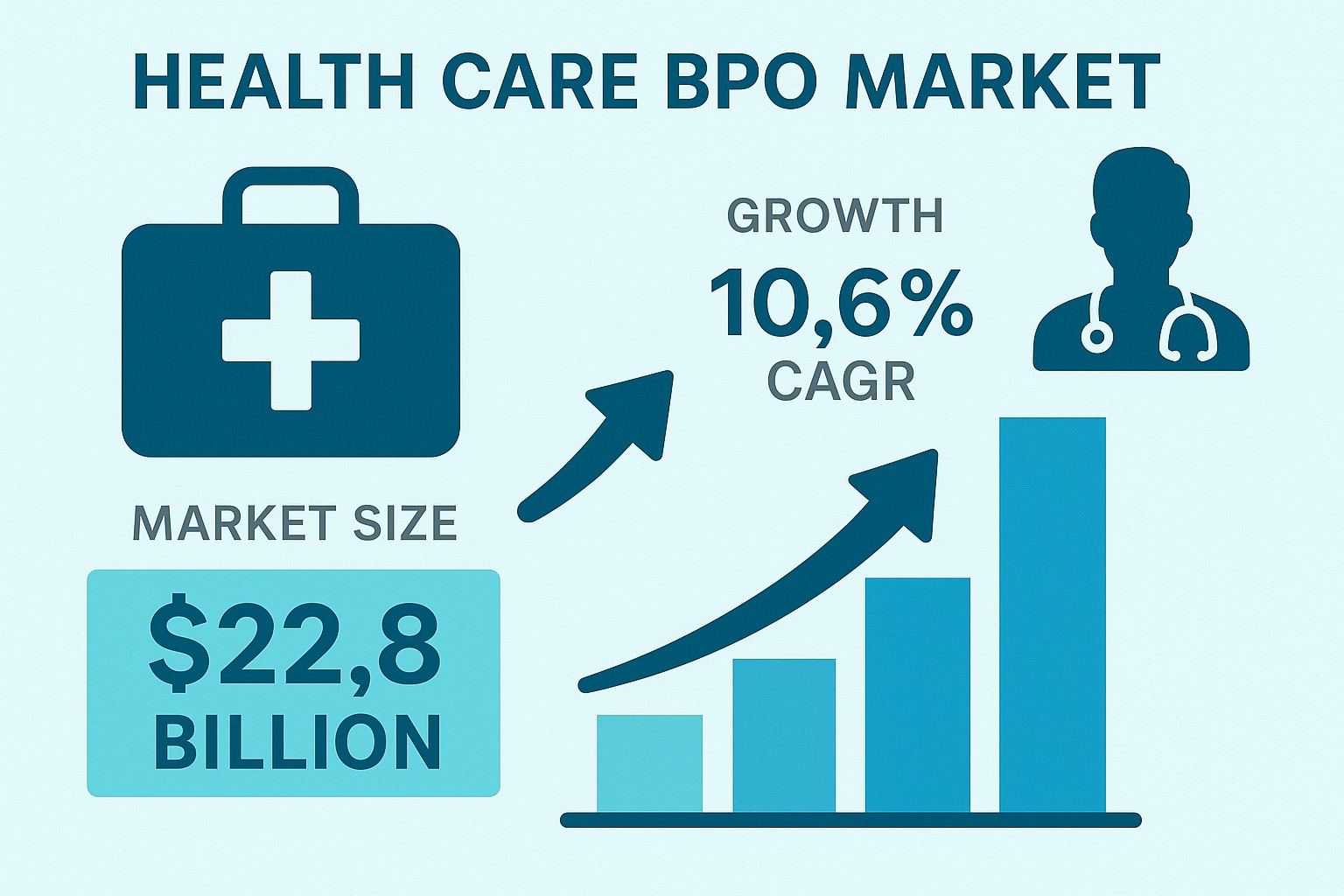The Life Sciences and Healthcare BPO markets are witnessing rapid growth, driven by the rising trend of pharmaceutical outsourcing, the adoption of artificial intelligence (AI), and a growing demand for cost-efficient and specialized services. As pharmaceutical companies look to improve operational efficiencies, increase innovation, and reduce costs, business process outsourcing (BPO) is becoming an integral part of their strategies. These trends are also reshaping the broader healthcare landscape, offering both challenges and opportunities for businesses in the sector.
Life Sciences BPO Market Expands Amid Pharma Outsourcing
The global Life Sciences BPO market is experiencing substantial growth, projected to reach USD 913.50 billion by 2034, up from USD 427.98 billion in 2024, with a compound annual growth rate (CAGR) of 7.88% (Precedence Research). The growth of this market is driven by increasing outsourcing in the pharmaceutical industry, specifically related to clinical trials, data management, and regulatory services.
One of the most notable drivers of the Life Sciences BPO market is the rise of pharmaceutical outsourcing. Pharmaceutical companies are increasingly outsourcing key business processes, such as clinical trials, to specialized third-party service providers. Outsourcing allows pharma companies to access specialized expertise and cutting-edge technology while reducing overhead costs. This trend has resulted in pharma outsourcing accounting for over 55% of the total revenue share in 2022 (BioSpace).
Additionally, medical device outsourcing is another rapidly growing segment, driven by rising demand for innovative medical devices. The integration of artificial intelligence (AI) and automation is playing a crucial role in improving the efficiency and accuracy of services like clinical trials and regulatory compliance. The use of AI in data management and clinical trial automation not only speeds up processes but also reduces human error, making operations more reliable and effective.
The Asia-Pacific region led the market in 2022 with a market share of 37.8%. This region’s dominance is driven by the availability of skilled labor and cost advantages, which makes it an attractive destination for outsourcing. Additionally, government regulations and increased investments in healthcare infrastructure in countries like India and China are expected to drive further growth in this region.
Healthcare BPO Market Booms with Growing Demand for Efficiency
The Healthcare BPO market is set to experience significant expansion, with projections estimating a rise from USD 417.7 billion in 2025 to USD 694.3 billion by 2030, at a CAGR of 10.7% (MarketsandMarkets). A major factor behind this growth is the growing demand for specialized services like Revenue Cycle Management (RCM), claims management, and healthcare analytics. With healthcare systems globally facing increasing pressure to reduce costs while improving patient outcomes, healthcare organizations are turning to BPO providers to streamline administrative and back-office operations.
The demand for Revenue Cycle Management (RCM), which involves optimizing the billing and payment process for healthcare providers, is increasing. By outsourcing RCM tasks, healthcare organizations can reduce billing errors, ensure quicker reimbursement, and improve overall financial health. Moreover, claims management and regulatory compliance are also major drivers of growth, as healthcare providers seek to comply with ever-evolving government regulations and avoid penalties for non-compliance.
The integration of Robotic Process Automation (RPA) and AI in healthcare BPO has proven to be a game-changer. RPA is being used to automate repetitive, manual processes such as claims processing, while AI helps with data analysis and predictive analytics. The use of AI and RPA streamlines operations, reduces operational costs, and enhances service accuracy, ultimately improving patient satisfaction and service delivery.
Key Drivers of Growth in Life Sciences and Healthcare BPO Markets
-
Outsourcing to Improve Efficiency: Pharma and healthcare organizations are increasingly turning to BPO providers to reduce operational costs and gain access to specialized expertise. This trend is fueling the expansion of the BPO market across both sectors.
-
Technology Integration: The adoption of AI, RPA, and cloud technologies is driving the efficiency of BPO services. These technologies enable faster processing, more accurate data handling, and more effective decision-making.
-
Regulatory Compliance: As both the pharmaceutical and healthcare sectors face ever-tightening regulatory environments, outsourcing helps companies navigate these complexities without compromising on quality.
-
Cost Reduction: Companies are looking for ways to cut costs, and outsourcing to regions with lower labor costs, such as Asia-Pacific and Eastern Europe, is a viable solution.
-
Market Demand for Innovation: As both industries demand faster and more innovative solutions, BPO providers are stepping in to meet these demands by offering cutting-edge technologies and industry-specific solutions.
Implications for Stakeholders in Life Sciences and Healthcare
For stakeholders in the Life Sciences and Healthcare sectors, understanding the dynamics driving the BPO market is essential. Key implications include:
-
Investment Opportunities: Investors can look to capitalize on the growth of outsourcing services in these markets. Identifying major players and emerging regions will be key to staying ahead of the curve.
-
Technology Integration: Embracing AI and RPA technologies can not only increase efficiency but also help organizations offer better services to clients. Stakeholders should be keen to invest in technology to stay competitive.
-
Compliance and Risk Management: As regulatory frameworks continue to evolve, outsourcing to specialized providers helps mitigate risks associated with non-compliance.
-
Global Expansion: By leveraging BPO partnerships, companies can expand their reach into new geographies and customer segments, gaining access to emerging markets with significant growth potential.
Conclusion: Future Outlook for Life Sciences and Healthcare BPO Markets
The future of the Life Sciences and Healthcare BPO markets looks promising. As more pharmaceutical and healthcare organizations outsource essential functions to specialized providers, the demand for innovative, AI-driven BPO services will continue to grow. Technological advancements like AI and automation will drive this transformation, improving operational efficiencies and allowing companies to focus on their core business functions.
External Resources for Further Insights:
-
Learn more about the Life Sciences BPO market expansion by visiting OpenPR.
-
For an in-depth Healthcare BPO market forecast, explore PR Newswire’s release.
-
Discover the latest research on BPO trends and technological integration from MarketsandMarkets.
-
Visit Grand View Research for detailed reports on life sciences BPO market growth and key trends.


